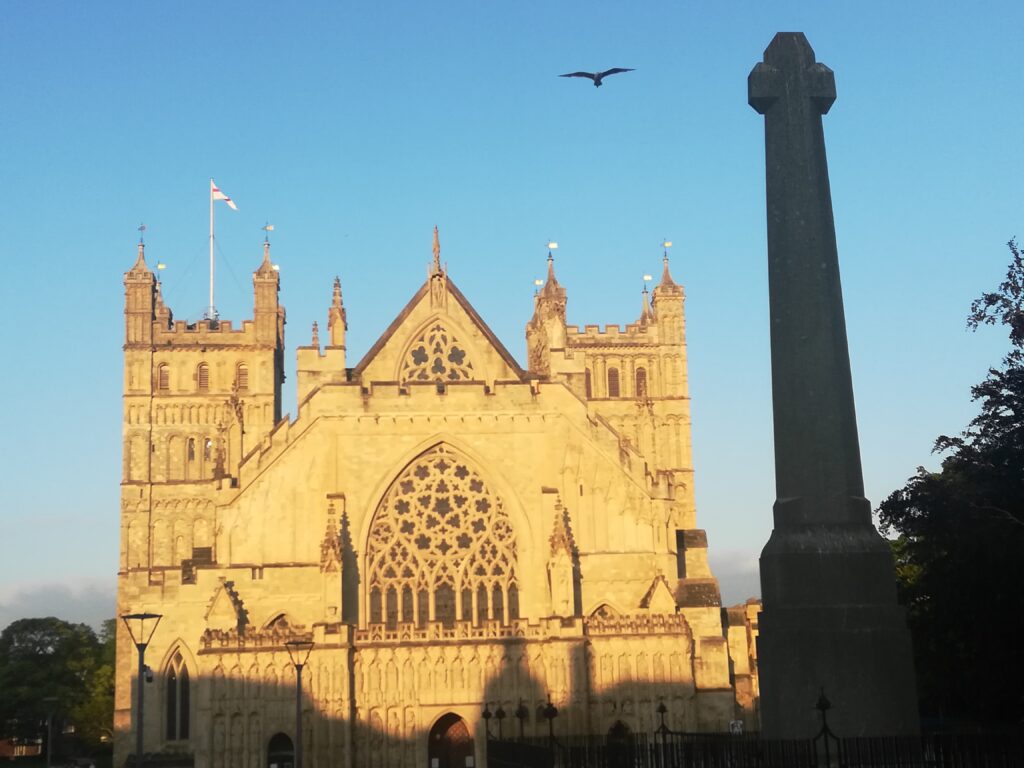Interpreting the ‘still, small voice’ of the Scriptures
On 11th February 2024, the Sunday Before Lent, Richard was invited by the Dean and Chapter to preach at the 4pm Choral Evensong in Exeter Cathedral, at which the Cathedral Choir sang a selection of early 17th century music, including the anthem It is a good thing by John Lugge, who was organist at Exeter Cathedral from 1603 to 1647.

The New Testament reading (2 Peter 1.16-21, see below) is one of the rare passages in the Bible which talks about the nature of the scriptures themselves in which the writer declares that “no prophecy ever came by human will, but men and women moved by the Holy Spirit spoke from God” (ὑπὸ πνεύματος ἁγίου φερόμενοι, v. 21). The Greek word translated as ‘moved’ is pheromenoi, from the verb meaning to ‘bear, carry, move, or convey’, and it also occurs in vv. 17-18 about the voice from heaven was ‘conveyed’ to Peter and the hearers on the mount of Transfiguration. In secular Greek, it is often used of ships being ‘borne along’ or ‘moved’ by the wind (see picture below), which is the same word also occurring in this verse 21, πνεύμα, pneuma, also translated as ‘spirit’ or ‘breath’ (giving us pneumatic tyres, pneumonia, etc). The other key New Testament passage about the scriptures describes them as θεόπνευστος, literally ‘God-breathed’ or ‘inspired’ (2 Timothy 3.15-17). Therefore the first part of the sermon explores what it means for us to interpret the Bible as somehow ‘inspired’ or moved by the wind of God’s breath or spirit.
2 Peter 1.16–21
16 For we did not follow cleverly devised myths when we made known to you the power and coming of our Lord Jesus Christ, but we had been eyewitnesses of his majesty. 17For he received honour and glory from God the Father when that voice was conveyed to him by the Majestic Glory, saying, ‘This is my Son, my Beloved, with whom I am well pleased.’ 18We ourselves heard this voice come from heaven, while we were with him on the holy mountain.
19 So we have the prophetic message more fully confirmed. You will do well to be attentive to this as to a lamp shining in a dark place, until the day dawns and the morning star rises in your hearts. 20First of all you must understand this, that no prophecy of scripture is a matter of one’s own interpretation, 21because no prophecy ever came by human will, but men and women moved by the Holy Spirit spoke from God.

In the light of this understanding of scriptural inspiration, we then turn to the Old Testament reading, the story of Elijah being terrified for his life, fleeing to Mount Horeb or Mt Sinai, where he experiences an earthquake, wind, and fire, the usual signs of an appearance of God in the Hebrew scriptures, but paradoxically, God is not in any of them (1 Kings 19.1-16). Instead, he is found in the ‘still small voice’, like the sound not of a rushing wind, but the gentlest of breezes, the ‘sound of silence’ – through which he gradually restores Elijah back to his courage, vision, and his vocation as a prophet.
1 Kings 19.1–16
Ahab told Jezebel all that Elijah had done, and how he had killed all the prophets with the sword. 2Then Jezebel sent a messenger to Elijah, saying, ‘So may the gods do to me, and more also, if I do not make your life like the life of one of them by this time tomorrow.’ 3Then he was afraid; he got up and fled for his life, and came to Beer-sheba, which belongs to Judah; he left his servant there. 4 But he himself went a day’s journey into the wilderness, and came and sat down under a solitary broom tree. He asked that he might die: ‘It is enough; now, O Lord, take away my life, for I am no better than my ancestors.’ 5Then he lay down under the broom tree and fell asleep. Suddenly an angel touched him and said to him, ‘Get up and eat.’ 6He looked, and there at his head was a cake baked on hot stones, and a jar of water. He ate and drank, and lay down again. 7The angel of the Lord came a second time, touched him, and said, ‘Get up and eat, otherwise the journey will be too much for you.’ 8He got up, and ate and drank; then he went in the strength of that food for forty days and forty nights to Horeb the mount of God.
9At that place he came to a cave, and spent the night there. Then the word of the Lord came to him, saying, ‘What are you doing here, Elijah?’ 10He answered, ‘I have been very zealous for the Lord, the God of hosts; for the Israelites have forsaken your covenant, thrown down your altars, and killed your prophets with the sword. I alone am left, and they are seeking my life, to take it away.’ 11 He said, ‘Go out and stand on the mountain before the Lord, for the Lord is about to pass by.’ Now there was a great wind, so strong that it was splitting mountains and breaking rocks in pieces before the Lord, but the Lord was not in the wind; and after the wind an earthquake, but the Lord was not in the earthquake; 12and after the earthquake a fire, but the Lord was not in the fire; and after the fire a sound of sheer silence.

13When Elijah heard it, he wrapped his face in his mantle and went out and stood at the entrance of the cave. Then there came a voice to him that said, ‘What are you doing here, Elijah?’ 14He answered, ‘I have been very zealous for the Lord, the God of hosts; for the Israelites have forsaken your covenant, thrown down your altars, and killed your prophets with the sword. I alone am left, and they are seeking my life, to take it away.’ 15Then the Lord said to him, ‘Go, return on your way to the wilderness of Damascus; when you arrive, you shall anoint Hazael as king over Aram. 16Also you shall anoint Jehu son of Nimshi as king over Israel; and you shall anoint Elisha son of Shaphat of Abel-meholah as prophet in your place.